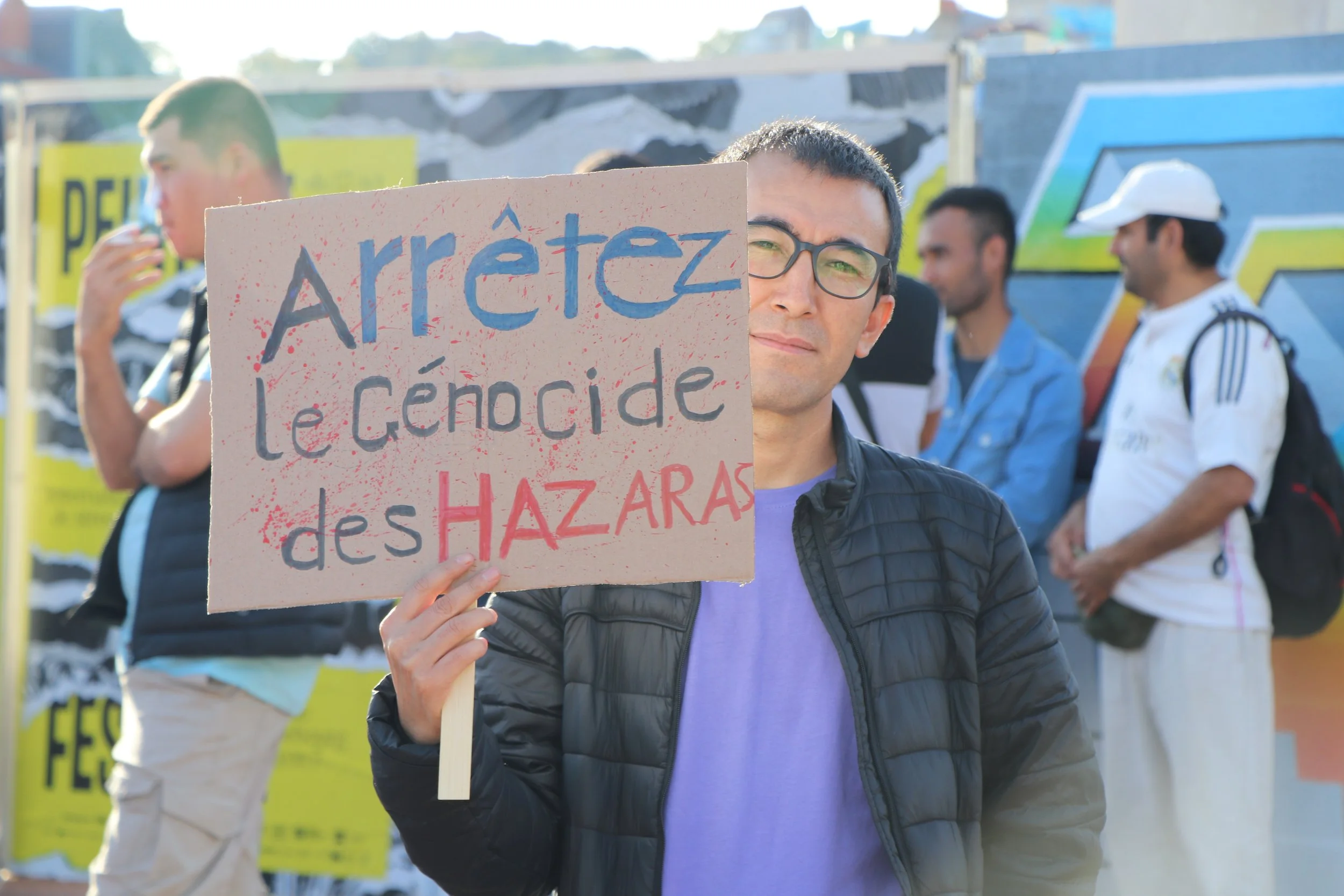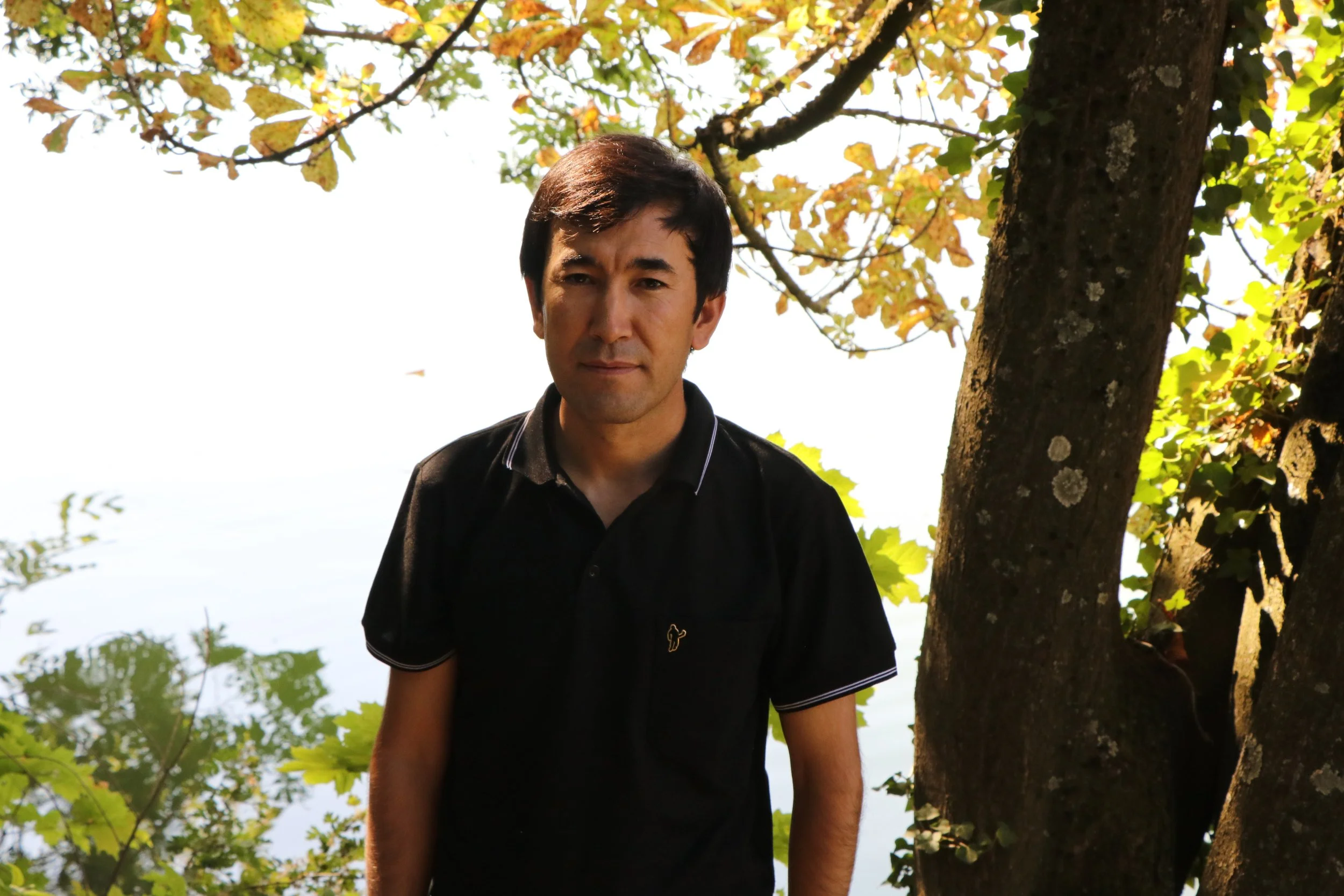Naim
(FRANCE)
“I was thinking to myself, You have worked so hard for twelve years to reach where you are. You earned respect and a place for yourself, and now it’s all over.”
نعیم
Naim holds degrees in Cinema and Theater and Directing from Kabul University and the Fine Arts Faculty. He has directed several short performances from Shakespeare's Black Fears. He began his work and his cultural, artistic and ecological activities at the United Nations office in Afghanistan. From 2013 to August 2021, he collaborated with a German organization to work on projects in Afghanistan focusing on education, culture and social diversity. Naim has organized several photography exhibitions and art student festivals in Kabul and organized the photographic exhibition “Un enfant en Afghanistan” in Berlin in collaboration with UNICEF in 2018.
On August 15, 2021, Naim supported and helped to evacuate nine young theater performers from Afghanistan to France. He continues to work with these nine young girls and they recently performed in a play he directed in Lyon, France called “The Lost Dream.
Q1: What is a single memory or story you remember from Afghanistan?
Once in 1997, during the Taliban’s first reign, we were headed to Jalah. Along the way, I noticed that two Taliban members were shoving a woman out of her house. I heard the woman crying, “I have no idea! He has not come home for a week now!” I assume she was talking about her husband who may have been a soldier or commander. They beat the woman repeatedly and she fell to the ground. I was terrified so I just continued on my way. A few days later, we were told that somebody had been killed in the village and we received an invitation to the funeral. Then, I found out that it was the woman I had seen — she had been killed in that moment.
A different memory that is bittersweet, but also funny, had to do with the Taliban’s rule that men wear lungis [a traditional scarf for men]. Three of our teachers were members of the Taliban. We called one of them “schoolmaster.” One night I was invited to a dinner party, and I forgot to bring my lungi, which was actually a regular scarf that my mom had taken from the mosque with me. Since I had to attend school the next day, I had no choice but to go without a lungi. We had no desks or chairs in our school. We used to sit on the ground. The class president shouted, “Schoolmaster is here!” My classmate who was sitting next to me had a very long lungi, so we both shared his. He wrapped the lungi around his head from one end of it and I did the same thing from the other end. When the schoolmaster stepped in and we stood up saying, “volarsaay” [“stand up” in Pashto] my lungi fell down. The schoolmaster walked a few steps toward me and said, “Come here.” He started telling me off, “You dirty, useless lad. Why didn’t you wear lungi.” “I’m sorry,” I apologized. “I won't forgive you and this has to be the last time!” he yelled at me.
We witnessed many dreadful things in those days. When they whipped people in public, they used to make us watch the whole thing. These are just some of the many memories I have from the Taliban’s first period of governance.
Q2: Tell us the exact moment you decided to leave Afghanistan.
I used to scroll through social media daily and the news always used to terrify me. It was a Sunday morning and I was on my way to the office when I noticed everything was different. The city that I grew up in now seemed strange to me. It was around 9:30 a.m. when the chaos began, and people started running and leaving the office. Everyone except for us, two Hazara boys and a guard, left. Before leaving the office, I received an email from my boss to collect all the photos from the office. On my way home, there was very heavy traffic, and some streets were even blocked. Some people carried bags, others didn’t, but no one had any idea of where they were heading to. We walked from Taimani to Kote Sangi. When I arrived home, I cried a lot. I was thinking to myself, “You have worked so hard for twelve years to reach where you are. You earned respect and a place for yourself, and now it’s all over.” Around 5 p.m. I received another email saying, “Leave the house now.” I was in shock, What does it mean? To where?
No phones could be reached. I asked my sister to pack my camera, laptop, and hard drives in a small bag. My family — they were all confused. After hours of struggling, I could finally ring the number and they told me to go near a cake shop in Kote Sangi. My colleagues and I gathered there. On my way there, I saw the Taliban shooting at people. The worst days were the days we were at the French Embassy because the Taliban could break in at any moment. I was worried about my female coworkers. I was thinking to myself: If anything bad happens to them, whether they get hurt or killed or raped, what would I say to their families? On the third day, we went towards a blue door. People were pushing and shoving each other. We sent the ladies first and we were behind them. Soon after, I realized two of my colleagues were not behind me. I was so worried about them, neither had any money nor did they know where to go. But eventually we all crossed the door.
It depresses me to this day that I had to let go of all the achievements for which I had worked so hard. I have lost everything. I don’t know what’s going to happen next. What policy will they pursue? What will the future of my people look like?
Naim participating in a protest in France.
Q3: What is something important that you wanted to bring with you? Or what is something you wanted to bring but could not?
I used to take photographs and make documentaries in Kabul. In the past few years, I bought a lot of equipment that I could not bring with me. But the things that were most precious to me were my hard drives, which, luckily, I have with me now. I will work more on them and share them with the world, showing them Kabul.
In 2019 I conducted a project called “Young Leaders.” The sponsor organization of the project appreciated it . We started this project with a desire to prove how young people can build trust, confidence, and respect for themselves by working with the elders of the area on a small project. This was one of the finest projects I carried out in Afghanistan, some pieces of which I brought, but other parts of it were impossible to carry.
Q4: If you could send a message that will be heard in thirty years, what would it be?
They need to understand all the painful and arduous things that have happened to us. It will be their responsibility to know how to deal with similar future incidents. Reciting these stories will be very effective in preventing an event like this from happening again.
A portrait of Naim in Afghanistan.
“Always have hope. No matter what happens — no matter how many obstacles you must face — have faith and hope. Difficulties will always arise, but you have to rise to the occasion.”



